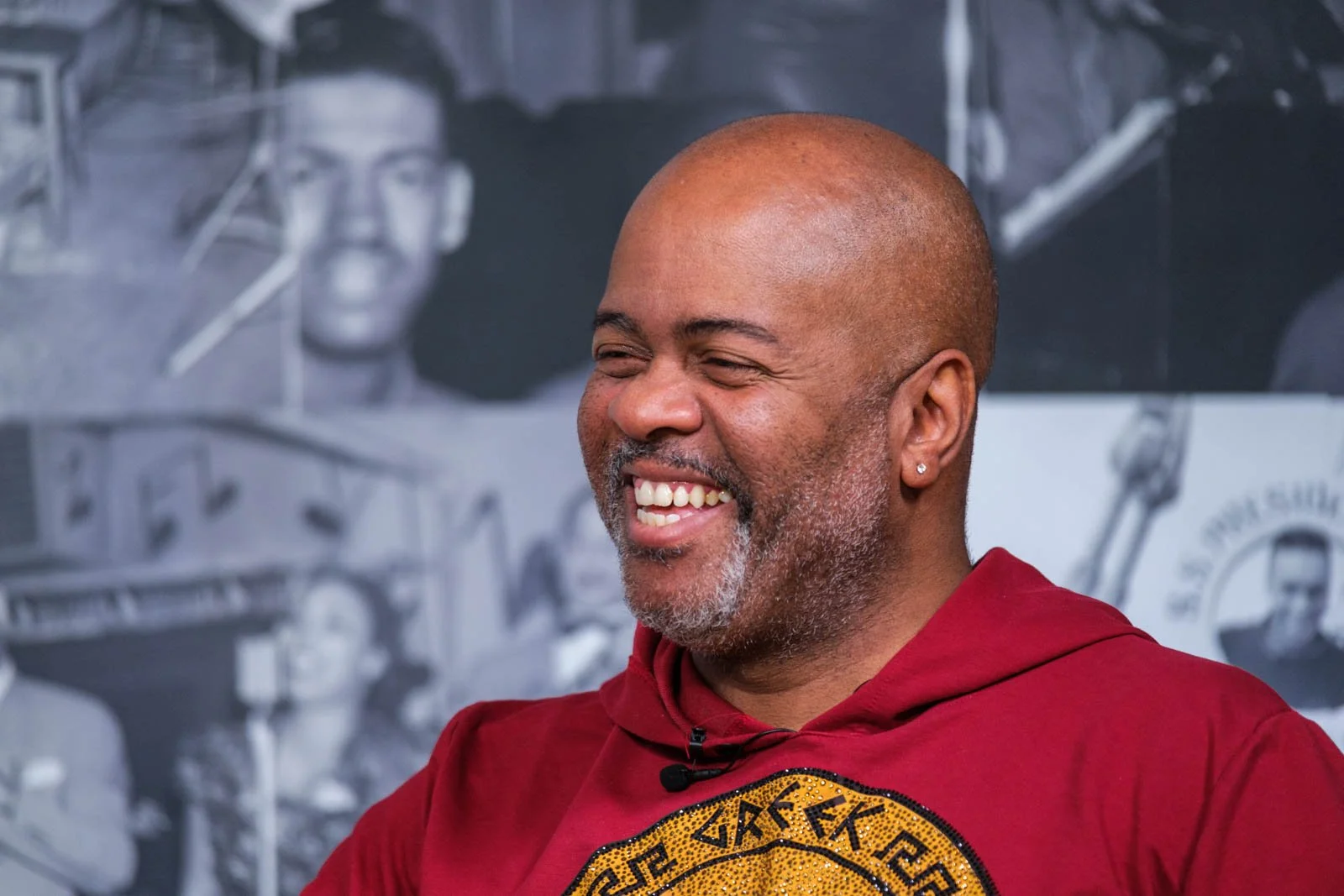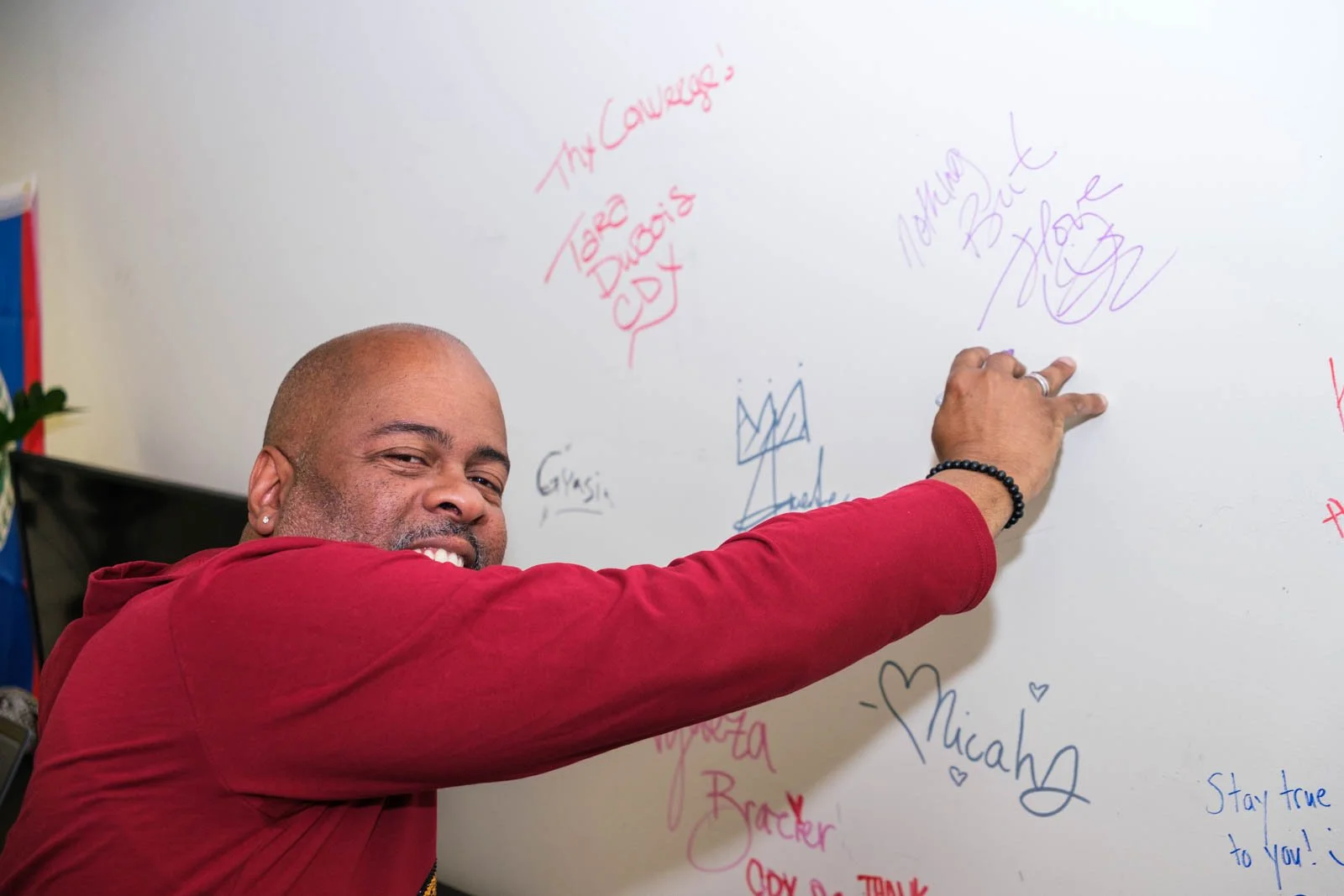Championing Change: Ernest Walker Talks his Journey, HIV Advocacy, and POCAAN's Impact on We Live In Color
Photos by Jordan Somers
Deaunte Damper returns with another inspiring episode of We Live In Color, featuring Ernest Walker, the Programs Director for People of Color Against AIDS Network (POCAAN). POCAAN, a King County-based organization, is dedicated to serving marginalized communities impacted by HIV/AIDS through prevention and awareness. In this segment, Walker shares his background and the impactful initiatives POCAAN is undertaking to support the community.
Walker, a Seattle native and the youngest of 11, grew up in the South End surrounded by a large family. A Garfield High School alumni, Walker was active in sports, playing basketball and participating in track on an all-star level.
"I got a chance, at a young age, to see a lot of the country," Walker said. "You know, traveling to different states every year and every summer to do track and basketball tournaments, but also traveling overseas, being on the traveling team. We went to China. I got a chance to go to Japan. I got a chance to go to a couple of places that normally the average kid my age wasn't going to."
Walker has also been openly gay since his youth, supported early on by a close-knit group of friends and his family.
"I always knew that I liked guys. I always knew that. It wasn't no shock to me," Walker said. "It was a shock to others, but I don't see how. I always had a lot of female friends. Those were my friends. My male friends were because I was great at sports, so they wanted me on their team."
He continued, "Most of them were in my corner because I was good at sports, but my female friends were really my girlfriends I hung out with and got a chance to really understand and be who I wanted to be around them because they made me feel comfortable about who I was opposed to the judgmental thing."
His family was also supportive, having already navigated a similar experience when his sister came out as a lesbian before Walker.
"She paved the way. She got the brunt of most of the things from my father and my grandmother around. "That's not right, and that's not God." Those types of things beating folks up with the church," Walker said. "Ultimately, when I came around, it was my aunts and sisters who really helped me feel more comfortable about who I was and not hide who I was. I never had to hide who I was."
After high school, Walker moved to Los Angeles in 2000 to gain independence and experience life independently, as he began to feel stuck at home. After some time on his own, he moved to Washington, DC, in December 2002.
"It was over from there," Walker said. "Black people everywhere doing everything. I'm talking Black gay people. I'm excited. It's almost like having those strict parents, and then you get to go to college, you know, the sky is the limit, and you got a smorgasbord."
It was here he dived into doing the HIV prevention work that he is still actively doing today, under the tutelage of Dr. Ron Simmons, a staple in LGBTQ activism and the President/CEO of Us Helping Us, People Into Living, a nonprofit community-based AIDS services organization which provided HIV prevention and support services to the African-American community in DC.
In DC, Walker immersed himself in HIV prevention work, a commitment he continues to this day. Under the mentorship of Dr. Ron Simmons, a prominent figure in LGBTQ activism and the President/CEO of Us Helping Us, People Into Living, Walker gained invaluable experience. His nonprofit work in providing community-based AIDS services and HIV prevention to the African-American community in DC shaped Walker's approach and dedication to his work.
"I just learned so much from the man," Walker said. "He was an activist. He stood up for what was right, and he didn't have a problem with calling people to the table and saying, there are things that are happening in our community, and we're ignoring it, or you're not putting money behind it to support it."
Walker initially became involved in HIV prevention during his senior year of college after his cousin contracted HIV while serving in the Air Force.
"Long story short, he was in Turkey, got shot, and they had him up in a military hospital in San Bernardino, California, and he was gone for so long we didn't know what had happened to him, Walker said. "We found out where he was. We finally got a chance to go see him, and then we found out at that time he was HIV positive."
The lack of knowledge in the late '90s surrounding HIV and the accompanying stigma led to his cousin receiving appalling hospital care.
"They weren't taking care of him. The nurses were scared to touch him. They were scared to take care of him. And so we watched him just die right before our eyes with no support other than what little we had and what little we knew about it," Walker said.
Walker tested positive in 2004, a turning point in his life that he describes as an "eye-opener."
"It was like, Wow, I did exactly what I was trying to get people not to do," Walker said. "It took me a while to become comfortable and okay with myself to say, "You're no different from them. So why would you think you couldn't catch this when you're doing things they were putting themselves at risk? You did the exact same things." And so I was able to really start thinking about how I see myself in a lens of, now you have something you can't get rid of, and now you're going to deal with it."
Walker relied heavily on family during this challenging time, and his sisters formed a strong support network.
"I got all my sisters—they're all on the phone: You're strong. We've dealt with so many things in our family. We got you back. Don't worry about it," Walker said.
Regarding his siblings, Walker credits his sister, Shirley Walker Wroten, as one of his biggest influences in pursuing the work he passionately advocates for today. Her impactful efforts within the Seattle school districts and with families inspired Walker to embark on his journey in community work.
"I saw myself really going into those types of things. I know that I'm a community person, and being around tons of nieces and nephews that I helped raise, it was one of those things that I know that some type of social type services I was going to be a part of," Walker said.
He continued, "POCAAN just really hit the mark for me because I loved what they were doing and what they were about when I first started working for them in 1998 and then to leave and come back to see how it just evolved. I mean, it's something to be proud of."
Walker is still with POCAAN, now the Director of Programs, twenty years later. Despite significant advancements in understanding HIV and the development of treatments that have transformed it from what was once thought to be a death sentence to a manageable condition with a strong quality of life, Walker emphasizes that there is still much work to be done.
"I think we're still dealing with this stigma," Walker said. "Stigma has been killing us from the beginning of time, and we still have never figured out how to fight it, how to overcome it, and then also how to support each other. The biggest challenge we face is that our community will not get behind each other and support each other for what's right."
Walker emphasizes that a lack of community effort and funding is hindering progress in the fight against HIV. Despite the significant impact of the virus on communities of color, there remains insufficient investment in prevention and support initiatives.
"There's no equitability around. How do we get the funds to address these issues so that we can do community mobilization stuff, billboards, and ads so that people can see these things? But those things cost a great deal," Walker said. "They're not giving away anything free anymore, and so really, the funds aren't behind it, and the stigma is still there."
Regarding whether HIV is a "gay man's disease," Walker disputes the historical connotations of what having the condition was once thought of as.
"Absolutely not, it's not a gay man's disease," Walker said. "It's anyone that's having unprotected sex or injection drug users. Anybody that is vulnerable and is having unprotected or sharing needles is susceptible to this, and that's important."
As for POCAAN's work, the organization is actively working to combat both the stigma and spread of HIV/AIDS through various support programs. They offer a homelessness program that provides housing and stability for individuals and families, a senior mobile medical unit that delivers medical services to senior centers in underserved communities, and a Pre-Exposure Prophylaxis (PrEP) clinic, which provides medication and medical care to prevent HIV infection.
"We actually have services where people who look like you are providing those services for you," Walker said.
Walker emphasizes that community support is integral for organizations like POCAAN to continue their vital work.
"I tell folks all the time, one of the best things you can do in your community is to get involved and know what's going on," Walker said. "If you think that these things are done just [by] us doing the work, you're sadly mistaken. It's getting done because community is getting behind us. That's helping us get the work done. We might be the vessel, but guess what? We need folks to get on the vessel and help us do this work."
Visit the POCAAN website by clicking here to learn more about Walker's work and the initiatives and programs there.
"My call to action to the community is, look, you all got to get involved. We're losing folks. This gun violence is getting out of hand. This human trafficking is way out of hand. This homelessness in our city is out of hand. You got to go to our city council meetings, get involved, and you dang sure gotta vote."
Join Deaunte every Thursday on all Converge Media platforms for more engaging conversations with guests like Walker, highlighting advocacy work, inclusivity, diversity, and living life in color!














